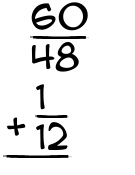What is 60/48 + 1/12?

|
This is how you add
|
|||||||||||||||||||||||||||||||||||||||
Step 1Our denominators (bottom numbers) don't match, so we can't add yet. 48 goes into 12 evenly, so we only need to multiply one term to get a common denominator. Multiply 1 by 4, and get 4, then we multiply 12 by 4 and get 48. This gives us a new problem that looks like so:
|
|||||||||||||||||||||||||||||||||||||||
Step 2Since our denominators match, we can add the numerators. 60 + 4 = 64 That gives us an answer of
|
|||||||||||||||||||||||||||||||||||||||
Step 3Can this fraction be reduced? First, we attempt to divide it by 2... Are both the numerator and the denominator evenly divisible by 2? Yes! So we reduce it:
Now, try the same number again. Are both the numerator and the denominator evenly divisible by 2? Yes! So we reduce it:
Now, try the same number again. Are both the numerator and the denominator evenly divisible by 2? Yes! So we reduce it:
Now, try the same number again. Are both the numerator and the denominator evenly divisible by 2? Yes! So we reduce it:
Now, try the same number again. Nope. Try the next prime number, 3... Nope. Try the next prime number, 5... No good. 5 is larger than 4. So we're done reducing. Congratulations! Here's your final answer to 60/48 + 1/12
|